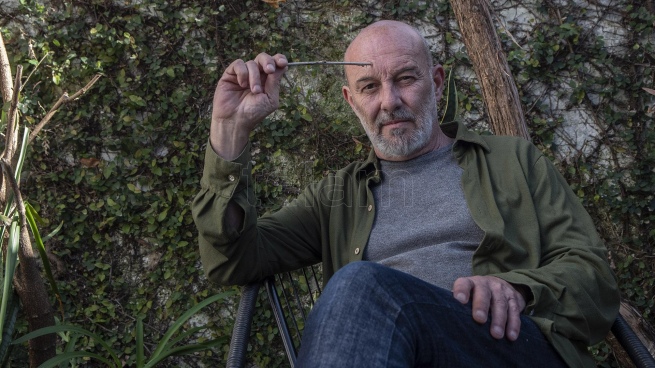The six stories of the book “bongo fury” published by Random House Literature – “The Wild Shapes in the Background, the Light in the Air”, “Ramalion”, “Yes, Yes”, “All Wishes”, “The Sculpture” and “Behind the Back” – reveal that in the genetics of River Plate literature the genre is in very good health.Each piece, each story that makes up the book creates an atmosphere, a unique universe, where the characters move, some at a non-human speed, others disoriented in their own territory, or in two different places at the same time.
The writer Sergio Bizzio, born in Villa Ramallo, province of Buenos Aires, in 1956 knows that his readers (he says this during the interview that took place in an email exchange) are not those who get angry at the surprises that his writing brings. Bizzio wrote the following novels “The Divine Convertible” (1990), “planet” (1998), “At that time” (2001), “Rage” (2004) “It was heaven” (2007) and “Lost” (2020). The titles of his storybooks are: “Guys” (2006), “In the Forest of Sexual Sleepwalking” (2013), “Two Space Fantasies” (2014), “The piramid” (2019), “The Conquest, Iris and Construction” (2019) and “Three Martians” (2020).
Télam: What is the rhythm that the title “Bongo fury” imposes on the stories?
Sergio Bizzio: The title has nothing to do with the content of the book. A friend told me the other day, as if I didn’t know. Y? It was a fluke. I had started writing about an album by Frank Zappa and Captain Beefheart that I really like, “Bongo fury”, locked up at home due to the pandemic. It wasn’t a note or an article, I wrote single sentences, impressions about the songs on the album, and suddenly the first paragraph of the first of the stories in the book appeared and I continued writing, always in that file, which was obviously called “Bongo fury” . Almost with the final point of that story I began to write another. I wrote three or four of the six stories in that file, so when it came time to give the book a title, what title was I going to give it?

T.: It is quite usual that in a collection of stories, the book bears the title of one of them, or the last one.
SB: I don’t like that. Neither in the books nor on the records. It gives the impression that one theme or story is more important than the others. “Bongo fury” is beautiful, like many other Zappa titles. Now I also like the idea, maybe just for me, of a correspondence between the album, which was my initial nourishment, so to speak, and the book. The idea that meaning is not in things but between them, at the crossroads.
T.: When you write stories, do you think about the tradition of the Argentine/River Plate story?
SB: No, I only think about what I write. And sometimes not even in that, I get carried away.
T.: How did you connect the different altered physical and mental states that take place in your stories?
SB: Well, you don’t have to be a great adventurer to realize that it’s very boring to know where you’re going, or that there’s something foolish about saying one thing in order to say another. But what is that other thing that one wants to say? I do not know. The only thing I know, and I’m not even sure (it’s an insecure knowledge), is that for some time now, a lot of things appear in what I write that have nothing to do with the main body of the story, voices, like if suddenly I tuned in to the voice of a parallel story. I welcome them with open arms. I wait for them. And if they don’t come I’m going to look for them, I make them up. They are random thoughts, spontaneous movements, without me professing any particular fondness for spontaneity, neither for nor against. They are things like “from outside”, from another part, and I love them. It’s the strange thing, who happens to say hello.

T.: How do you bring the magical or the marvelous into the reality of your stories?
SB: Maybe I should talk about ambiguity. A game with ambiguity. Ambiguity is always a temptation for me, “an invitation to the dance”, as Strindberg said. I call it “psychedelia”, which is clearer. I find “Bongo Fury” to be quite psychedelic.
T.: Is there a previous configuration in the corpus of stories in this book?
SB: No. What could you configure? I liked putting together the three or four stories I had written in the Bongo fury archive with the others, and giving them a “seen” order. That’s what musicians do with the songs on a record, or painters when they hang their work in a gallery. The task has its charm, but I wouldn’t call it a setup. It would be too much.
T.: Last year, when you published “Lost”, Télam asked you why the narrator was suddenly talking about a television, in a novel that takes place in the 16th century. That did not end there: there were people outraged in the networks by that presence.
SB: Yes, every once in a while I get little messages. It’s amazing that there are people who get angry about something like this. One told me that the television was a provocation for publicity purposes. Another, an Literature teacher, wished me “the worst”, in the best Fernando Iglesias style. It’s unusual. They have a very ugly relationship with literature, needless to say. They read like policemen, they only accept the game if it is a game with a matrix. Well, sorry for the joke but let’s change the channel.
T.: Obviously they were not your readers. How do you imagine your readers?
SB: I’m going to copy a phrase from Virginia Woolf that I underlined a few days ago. “The readers capable of constructing with a few scattered hints the entire circumference and scope of a living person; the readers capable of transmuting our mere whisper into an unmistakable voice; the readers capable of perceiving, whether we describe or not, a precise face, and to intuit, without a word to help them, an exact thought. Let’s write only for such readers”. Now that I type it I realize that it is a bit pedantic. But hey, not bad.
T.: And you as a reader, do you read authors of the new generations?
SB: Yes, of course. I read everything I can. Mansalva recently published two books that I really liked: “This love so great”, by Marie Gouiric, poems of a rare sweetness, as sharp, and a novel that is very funny and dramatic at the same time, “El yanqui”, by Delfina Korn . There were also books by two of my favorite authors, Mauro Libertella and Fabio Kacero. Reader, read. There are many good things out there.
T.: Would you say that space and time, the changing geographies, the speed with which we are approaching the end, are an allegory or the message in these stories?
SB: The truth is that I don’t feel any interest in the message. It is nonsense to use literature as a vehicle to carry a passenger like that, so assertive. I don’t know what bothers me more, the message, the allegorical or the assertive. Actually these three things almost always go together. They are the three columns of solemnity, which is sometimes presented as popular wisdom and sometimes as exquisite revelation. And at the base, turning between the columns and glancing seductively back, like the Tadzio in “Death in Venice”, is El Tema, that guarantee without which hardly anyone seems willing to lift a finger, neither writers nor readers.
T.: Do you feel more comfortable with the novel or the story?
SB: I feel comfortable writing. The only uncomfortable thing is the gap between one story and another, between one novel and another. Sometimes it gets too long and becomes more than just uncomfortable.


















